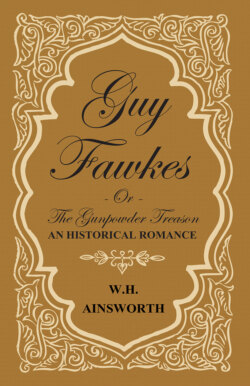Читать книгу Guy Fawkes Or The Gunpowder Treason - An Historical Romance - William Harrison Ainsworth - Страница 11
На сайте Литреса книга снята с продажи.
ОглавлениеCHAPTER II.
ORDSALL CAVE.
After rescuing the unfortunate prophetess from a watery grave in the manner just related, the soldier snatched up his cloak, and, taking his dripping burthen in his arms, hurried swiftly along the bank of the river, until he came to a large cleft in the rock, into which he crept, taking the prophetess with him, and thus eluded observation. In this retreat he continued upwards of two hours, during which time the poor creature, to whom he paid every attention that circumstances would admit, had so far recovered as to be able to speak. But it was evident that the shock had been too much for her, and that she was sinking fast. She was so faint that she could scarcely move; but she expressed a strong desire to reach her cell before she breathed her last. Having described its situation as accurately as she could to the soldier—who before he ventured forth peeped out to reconnoitre—he again raised her in his arms, and by her direction struck into a narrow lane skirting the bank of the river.
Pursuing this road for about half a mile, he arrived at the foot of a small knoll, covered by a clump of magnificent beech-trees, and still acting under the guidance of the dying woman, whose voice grew more feeble each instant, he mounted it, and from its summit took a rapid survey of the surrounding country. On the opposite bank of the river stood an old hall, while further on, at some distance, he could perceive through the trees the gables and chimneys of another ancient mansion.
“Raise me up,” said Elizabeth Orton, as he lingered on this spot for a moment. “In that old house, which you see yonder, Hulme Hall, I was born. I would willingly take one look at it before I die.”
And the other hall, which I discern through the trees, is Ordsall, is it not?” inquired the soldier.
“It is,” replied the prophetess. “And now let us make what haste we can. We have not far to go; and I feel I shall not last long.”
Descending the eminence, and again entering the lane, which here made a turn, the soldier approached a grassy space, walled in on either side by steep sandstone rocks. At the further extremity of the enclosure, after a moment’s search, by the direction of his companion, he found, artfully concealed by overhanging brushwood, the mouth of a small cave. He crept into the excavation, and found it about six feet high, and of considerable depth. The roof was ornamented with Runic characters and other grotesque and half-effaced inscriptions, while the sides were embellished with Gothic tracery, amid which the letters I.H.S., carved in ancient church text, could be easily distinguished. Tradition assigned the cell to the priests of Odin, but it was evident that worshippers at other and holier altars had more recently made it their retreat. Its present occupant had furnished it with a straw pallet, and a small wooden crucifix fixed in a recess in the wall. Gently depositing her upon the pallet, the soldier took a seat beside her on a stone slab at the foot of the bed. He next, at her request, as the cave was rendered almost wholly dark by the overhanging trees, struck a light, and set fire to a candle placed within a lantern.
After a few moments passed in prayer, the recluse begged him to give her the crucifix that she might clasp it to her breast. This done, she became more composed, and prepared to meet her end. Suddenly, as if something had again disturbed her, she opened wide her glazing eyes, and starting up with a dying effort, stretched out her hands.
“I see him before them!” she cried. “They examine him—they adjudge him! Ah! he is now in a dungeon! See, the torturers advance! He is placed on the rack—once—twice—thrice—they turn the levers! His joints snap in their sockets—his sinews crack! Mercy! he confesses! He is led to execution. I see him ascend the scaffold!”
“Whom do you behold?” inquired the soldier, listening to her in astonishment.
“His face is hidden from me,” replied the prophetess; “but his figure is not unlike your own. Ha! I hear the executioner pronounce his name. How are you called?”
“Guy Fawkes,” replied the soldier.
“It is the name I heard,” rejoined Elizabeth Orton.
And, sinking backward, she expired.
Guy Fawkes gazed at her for some time, till he felt assured that the last spark of life had fled. He then turned away, and placing his hand upon his chin, became lost in deep reflection.
